Ciné Gael Montréal Irish Film Series 1993
In 1992, the Cultural Committee of the St. Patrick's Society of Montréal received a proposal from film-buff Anthony Kirby that Montréal needed an Irish film series. The committee agreed to fund the wildly hysterical plans of Lynn Doyle, Patrick Vallely and several other miscreants, to form and run a film society devoted to showing Irish Films.
The name Ciné Gael Montréal was proposed and scheduling and film selection started, with outside assistance coming from Fr. Marc Gervais SJ, Peter Rist, Ben Queenan and most importantly, the film archives and screening facilities at Concordia University. Early in 1993, we screened our first film.
On our 20th anniversary, when we asked our members to tell us the film from our past seasons that we should show again, it was that first film.
Read more about our history,
written by Dana Hearne on our 10th
and our 15th anniversary, as well as John Griffin's
article from the Gazette,
written on our 20
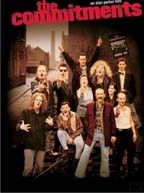 with Robert Arkins, Andrew Strong, Johnny Murphy,
Angelina Ball. Scenario: Dick Clement. Ian LaFrenais and Roddy Doyle.
Cinematography: Gale Tattersail.
with Robert Arkins, Andrew Strong, Johnny Murphy,
Angelina Ball. Scenario: Dick Clement. Ian LaFrenais and Roddy Doyle.
Cinematography: Gale Tattersail.

A street-smart musical comedy with a generous dollop
of Roddy Doyle’s gamy Dublin argot. Brilliant!
Patrick Valleley introduced the film.
 with Robert Shaw, Mary Ure, Liam Redmond. Scenario: Brian Moore.
with Robert Shaw, Mary Ure, Liam Redmond. Scenario: Brian Moore.
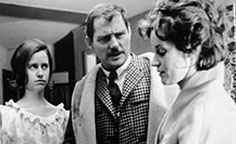
Montréal looks bleak to an Irish immigrant, played by Robert Shaw,
who has an attitude problem and finds it difficult to keep a job or a family. One of Shaw’s
very best screen performances.
Kevin Tierney introduced the film.
 with John Wayne, Maureen O’Hara, Barry Fitzgerald, Victor McLaglen, Ward Bond.
with John Wayne, Maureen O’Hara, Barry Fitzgerald, Victor McLaglen, Ward Bond.
 "An Irish version of “The Taming of the Shrew”. “John Ford’s
art and artifice...are employed to reveal a way of life - stable, rooted, honourable,
purposeful in nature’s way, and thereby rhythmic. Everyone is an individual, yet
everyone and everything has a place.” — Henry Hart
"An Irish version of “The Taming of the Shrew”. “John Ford’s
art and artifice...are employed to reveal a way of life - stable, rooted, honourable,
purposeful in nature’s way, and thereby rhythmic. Everyone is an individual, yet
everyone and everything has a place.” — Henry Hart
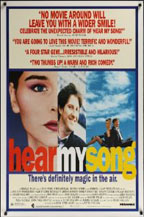 with Adrian Dunbar, Tara Fitzgerald, Ned Beatty, David McCallum, Brian Flanagan, Shirley Anne Field.
with Adrian Dunbar, Tara Fitzgerald, Ned Beatty, David McCallum, Brian Flanagan, Shirley Anne Field.

A film about a fugitive music-hall performer,
Josef Locke, that succeeds in hitting all the high notes.
“It helps restore some of your faith in young,
untested directors with mostly young, mostly untested casts.” —
Marc Horton
Introduced by Michael Callahan, without his fiddle!
 with Stephen Brennan, Eamon Morrissey, Nial Toibin, Joe Lynch.
with Stephen Brennan, Eamon Morrissey, Nial Toibin, Joe Lynch.

Eat The Peach is a wryly amusing tale
about two unemployed men who build a Wall of Death in the backyard of one of
their homes in the middle of a flat—landscaped peat bog.
It’s a comedy that touches on some sensitive Irish issues: unemployment,
the withdrawal of foreign investment, the uneasy attitude in the South towards
“the troubles” in the North. Unemployment!
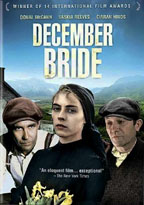 with Saskia Reeves, Donal McCann, Ciaran Hinds.
with Saskia Reeves, Donal McCann, Ciaran Hinds.
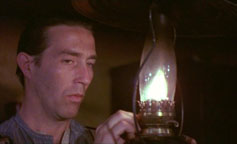
The story of a woman and her relationship with two brothers. It is both
an unconventional love story and a study of a long trial of strength between
an independent woman and the unbending Protestant community in which she lives.
Lovingly shot by French cinematographer Bruno de Keyzer
(Round Midnight).
Read more about the movie here.
with Liam Heffernan, Vincent Murphy, Gina Moxley, Alan Devlin.
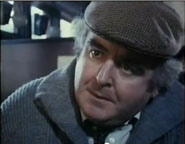 Centers on the trials and tribulations of a high school student who,
although a good hurler on the local team, has much to combat in depressed Ireland.
Centers on the trials and tribulations of a high school student who,
although a good hurler on the local team, has much to combat in depressed Ireland.
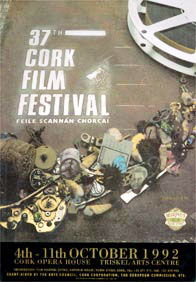 starring Patrick Fitzgerald and Nye Heron.
starring Patrick Fitzgerald and Nye Heron.
It’s a long way to America from Ireland and the truth can get stretched
in between. When a young man comes to work in his uncle’s business, he discovers that his uncle
is not the man he thought he was.
“Best Black & White Short” Award - Cork Film Festival, 1992.
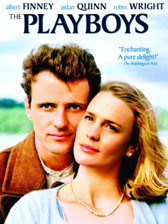 with Albert Finney, Aidan Quinn, Robin Wright, Milo O’Shea.
with Albert Finney, Aidan Quinn, Robin Wright, Milo O’Shea.
“In this romantic feminist fairy tale a young heroine is content
to raise her baby without male assistance of any kind. The film ends with a very upbeat message
about the potential for women’s independence...On the flip side of all the elation,
however, is a very palpable sadness, left by the sublime character work of Albert Finney.” —
Edmond Grant
 "This absorbing, uneven romantic comedy-drama,
set in a small Irish town in 1957, takes its name from a travelling troupe.
The heroine is an unwed mother named Tara (Robin Wright). She challenges every male
authority figure in town and drives all the men wild—especially the violent,
alcoholic constable, Sergeant Hegarty (Albert Finney), who seethes when he sees her
with her actor lover Tom (Aidan Quinn).
"This absorbing, uneven romantic comedy-drama,
set in a small Irish town in 1957, takes its name from a travelling troupe.
The heroine is an unwed mother named Tara (Robin Wright). She challenges every male
authority figure in town and drives all the men wild—especially the violent,
alcoholic constable, Sergeant Hegarty (Albert Finney), who seethes when he sees her
with her actor lover Tom (Aidan Quinn).
The screenwriters, Shane Connaughton
(who co-wrote My Left Foot) and Kerry Crabbe, are full of ideas and observations
about orthodox religion, claustrophobic village mores, the craziness of life
in a divided country, and the last gasp of strolling players before TV’s ascendancy.
Wright and Quinn are well matched, and the director, Gillies MacKinnon,
and his cinematographer, Jack Conroy, provide images that sparkle with amorous
possibilities. But the filmmakers don’t funnel their panoply of themes gracefully
into Tara’s story. Her affair with Tom comes off as a foil to Finney’s passionate
portrait of stewed wrath and despair. He endows a clenched, masochistic character
with such scale and force that he takes over the movie." -
by Michael Sragow
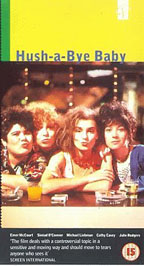 with Emer McCourt, Mlchael Liebman, Cathy Casey, Julie Marie Reynolds, Sinéad O’Connor.
with Emer McCourt, Mlchael Liebman, Cathy Casey, Julie Marie Reynolds, Sinéad O’Connor.
The film is set in Derry in 1984 and stars Emer McCourt who won Bronze Leopard
for Best Actress at the Locarno Film Festival in Switzerland for her portrayal
of a young woman who becomes pregnant and wrestles with the pressures of the
situation. When her boyfriend is “lifted” in a British Army swoop, she feels
totally alone and unable to tell anyone. This film depicts life as it is for
young women in Ireland in the year after the abortion referendum.
 Sinéad O’Connor composed the score of the film and
appears in a supporting role.
Sinéad O’Connor composed the score of the film and
appears in a supporting role.
Hush-A-Bye Baby
received the Ecumenical Award at Locarno. Margo Harkin won Best Director at the
Orleans Festival and the film won Best Drama Award at the Celtic Film Festival.
Read more here.
Dana Hearne, raised in Dublin, and teaching at John Abbott, introduced the film.





 click here!
click here!